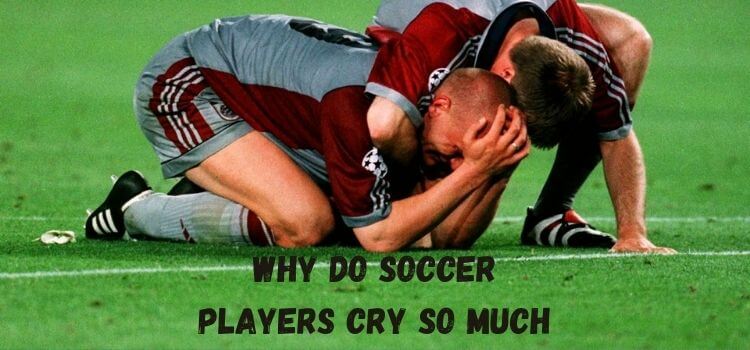As an Amazon Associate, I earn from qualifying purchases
Soccer, the world’s most popular sport, often evokes intense emotions among players and fans alike. One common sight on the field is soccer players shedding tears, whether in moments of triumph or despair. But why do soccer players cry so much? Let’s delve into the multifaceted reasons behind this emotional display.

The Pressure of Performance
Soccer players face immense pressure to perform at the highest level, particularly in high-stakes matches such as finals or derbies.
The weight of expectations from fans, coaches, and even themselves can become overwhelming, leading to emotional outbursts, including tears.
The fear of failure and the desire to succeed can heighten emotions on the field, making players more susceptible to crying.
Physical Pain and Injuries
Injuries are an inherent risk in soccer, with players often enduring physical pain during matches. The agony of sustaining an injury, especially one that threatens to end their participation in a game or tournament, can trigger emotional responses, including tears.
The combination of physical discomfort and the realization of the impact on their team’s performance can be emotionally distressing for players.
Emotional Investment in the Game
Soccer players are deeply passionate about the sport, dedicating their lives to mastering their craft. The emotional investment in each match, coupled with the intense desire to win, can lead to heightened emotional responses, including tears of joy or frustration.
The emotional rollercoaster of victories and defeats reflects the players’ commitment and attachment to the game.
Criticism and Public Scrutiny
Modern soccer is accompanied by intense media scrutiny and social media commentary, exposing players to constant evaluation and criticism.
Negative feedback from pundits, fans, or online trolls can take a toll on players’ mental well-being, making them more vulnerable to emotional outbursts, including tears.
The pressure to perform under the watchful eyes of millions can be emotionally draining for players.
Team Dynamics and Support
Despite being individual athletes, soccer players are part of a team where camaraderie and solidarity play crucial roles.
The bonds formed with teammates create a support system wherein players feel comfortable expressing their emotions, including tears, without fear of judgment.
The sense of unity and belonging within the team can encourage players to display their feelings openly.
Personal Tragedies and Adversities
Like anyone else, soccer players face personal tragedies and adversities that can profoundly affect their emotional well-being. Whether it’s dealing with loss, family issues, or mental health struggles, players carry their off-field burdens onto the pitch.
Soccer often serves as an emotional outlet for players, allowing them to release pent-up emotions, including tears, amidst the intensity of the game.
Cultural and Societal Norms
Male athletes have evolved in their perception of expressing emotions, including crying. This has challenged traditional notions of masculinity.
Cultural differences also play a significant role, with some societies being more accepting of emotional displays than others. Soccer, being a global sport, reflects this diversity, with players from different backgrounds exhibiting varying levels of emotional expression.
Mental Health Awareness
In recent years, there has been a growing emphasis on mental health awareness in sports, including soccer. Destigmatizing emotions and promoting open dialogue about mental well-being are essential steps towards supporting players’ emotional health.
Encouraging players to seek help and providing them with access to psychological support can help them manage their emotions more effectively on and off the field.
Strategies for Coping
Soccer players employ various strategies to cope with the emotional demands of the sport. From mindfulness techniques to seeking professional counselling, players can access resources to enhance their mental resilience.
Building a supportive team environment where players can openly communicate their feelings is crucial in managing emotional distress and reducing instances of crying on the field.
Positive Outcomes of Emotional Expression
While some perceive crying as a sign of weakness, it can also catalyze positive outcomes. Expressing emotions, whether it’s joy, sadness, or frustration, fosters emotional catharsis and strengthens interpersonal bonds within the team.
Through vulnerability and shared experiences, players develop resilience and unity, ultimately enhancing their performance on the field.
Conclusion: Soccer Players Cry
The prevalence of tears among soccer players is a testament to the emotional intensity of the sport. From the pressure of performance to personal struggles off the field, soccer encompasses a wide range of emotions that players navigate during their careers.
Understanding and acknowledging the complexities of these emotions are essential steps towards promoting the mental well-being of players and fostering a supportive soccer culture.
FAQs (Frequently Asked Questions)
No, not every soccer player cries during matches. Emotional displays vary depending on the individual and the circumstances of the game.
No, tears are a natural expression of emotions and should not be equated with weakness. Soccer players, like any other athletes, experience highs and lows that evoke emotional responses.
Teammates often offer support and encouragement to a player who is visibly upset. The sense of camaraderie within the team fosters empathy and solidarity during emotional moments.
Emotional expression varies among individuals regardless of gender. While cultural and societal norms may influence perceptions of emotional displays, both male and female soccer players experience and express emotions on the field.
Emotional distress, including crying, can temporarily affect a player’s focus and concentration. However, it is essential to address underlying issues and provide support to ensure that emotional well-being does not detrimentally impact performance.
Read Our More Articles
- Where Do Soccer Players Play on Turf?
- What a Soccer Player Guards Crossword: A Comprehensive Guide
- What Makes a Great Soccer Player? An In-Depth Look
As an Amazon Associate, I earn from qualifying purchases


